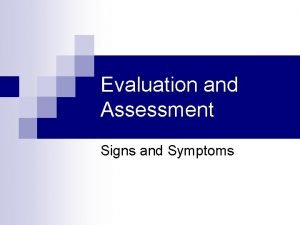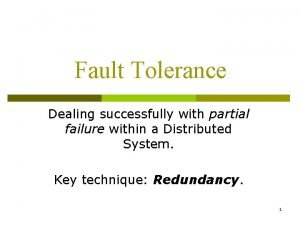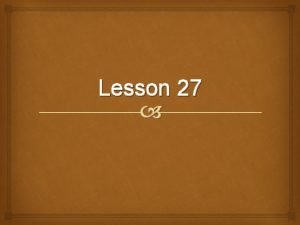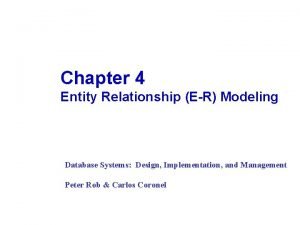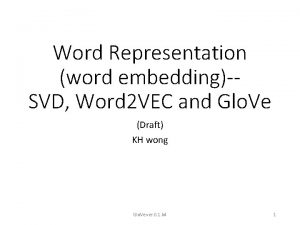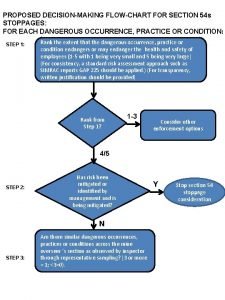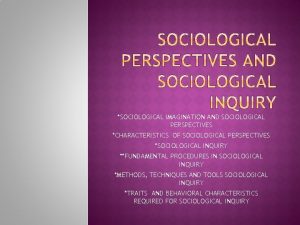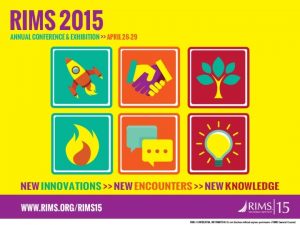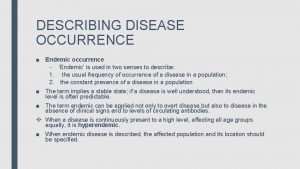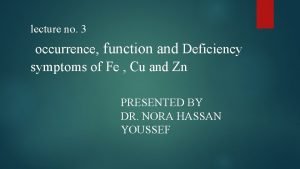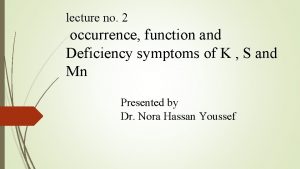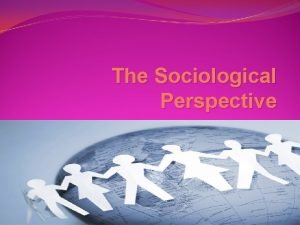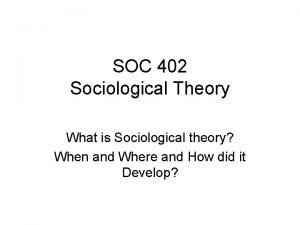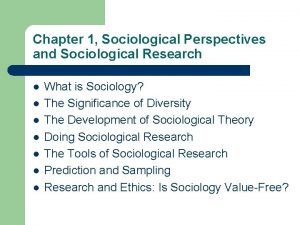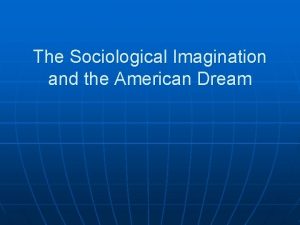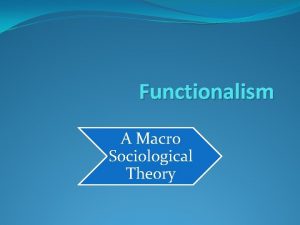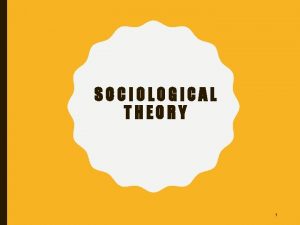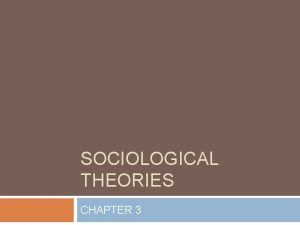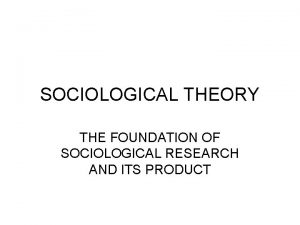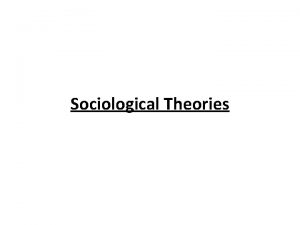Fundamental Sociological Symptoms as a Source of Occurrence























- Slides: 23

Fundamental Sociological Symptoms as a Source of Occurrence of Turbulence Indonesian Society During the Post-reform Presented at the 1 st UPI International Conference on Sociology Education, 12 October 2015 Dasim Budimansyah Professor in Sociology of Citizenship Faculty of Social Science Education UPI budimansyah@upi. edu Committee of The 1 st UPI International Conference on Sociology Education 2015 1

Table of Content q q q Introduction Fundamental Sociological Symptoms Comunitarian Movement How to build Indonesian character? Conclusion: Repositioning the Role of Sociology 2

Introduction q q Indonesian political and social life conditions of the New Order Era (1966 -1998) were criticized for lacking reflect the ideals of a democratic society. The presumption for this is that the mistake was rooted in the authority of the state through excess of an indoctrination of politics. 3

Continue. . q q After the fall of the authoritarian regime, i. e. after indoctrination was over, great hopes arise that the life of the nation will be more democratic. Are then the Indonesian political life to become more democratic? 4

Continue. . q q After almost two decades, it seems that this expectation is not so visible, with the exception of the aspects of freedom of expression where there have been bigger opportunities available than those during the authoritarian regime. On the other hand, in the era of 'democratic transition' Indonesian people are confronted with the various phenomena that really concern people's lives. 5

Continue. . In the society bad characters emerge as typified by the drastic and fantastic change in social and cultural life. Some examples as follows: q The people who were formerly known as patient, friendly, courteous and good at small talks are now becoming grumpy, abusive, and vindictive. q They mistreat fellow human beings in the hustle of the city. q People of different villages/tribes savagely fight with each other. q Even more tragic, our students are hurting each other in the streets. q Level of discipline in our society in various fields of life also does not seem encouraging, even obeying a simple rule such as riding/driving on a street is still very poor. 6

Question q On the basis of this reality it is imperative that we investigate seriously what exactly the source of the aforementioned phenomena is? 7

Fundamental Sociological Symptoms q Turbulent situations as we feel today after the reform can be explained sociologically because they have something to do with social structures and cultural systems that were built in the past. 8

Continue. . . l Analysis of the situations after the 1998 reform reveals there are some fundamental sociological phenomena, which may motivate the upheavals in our society today. 9

Continue. . q First, after the collapse of the "autocracy" power structures of the New Order regime, what we get is oligarchy (not democracy) where power is concentrated in a small group of elites, while the majority of the people (demos) remain distant from the sources of power (authority, money, law, information, education, and so on). 10

The facts of oligarchy This observation is confirmed by the following facts: q The formal political power is controlled by a small group of political party people through election by which they exploit people’s vote only to gain seats in the Parliament. Through the Parliament this group has the right on behalf of the people to carry out their own political agendas, which are at times at odds with the real interests of the people. q The charismatic power rooted in traditions and religions is held by a few people who are able to drive people’s loyalty and emotions to attain obscured goals for themselves is not clear. q Formal legal power controlled by law practitioners and enforcers with their expertise and/or authority can regulate who is right and who is wrong. q Most of the money in this country is in the hands of a small group of people who are actually being cornered politically. This group can buy the "truth" through legal institutions, demonstations, formation of public opinion through mass media, even the seats in the parliament. q A small group of local elites have a formal or informal authority on behalf of people’s aspirations for their own benefit. This group often voiced separatism, federalism, broad autonomy, even the issue of natives. q Vocal minority groups who frequently commit acts of demonstration on behalf of the ordinary people in ways that often even intrude the general public (vigilantism, violence, sweeping, conflict between mass with security forces and etc). 11

Continue. . . Second, the source of the upheavals in our society today is sociocultural animosity. Socio-cultural animosity is a socio-cultural hatred that stems from differences in cultural traits and fate differences of past history, so the element of desire for revenge prevails. q This covert conflict is latent because a variety of mechanisms of dissemination of hatred take place in almost all institutions of socialization in the community (ranging from families, schools, villages, places of worship, mass media, mass organizations, political organizations, and so on). 12

Question q The question is why such things happen? If you look at the integration process of the Indonesian nation, the problem lies in the lack of natural and participatory agreed values (normative integration) and the integration relied more on the power approach (coercive integration). 13

Continue. . q On the basis of this reality, the ideals of the reform to build a new Indonesian society should be realized by building on the results of an overhaul of the whole order of life of the past. The core of these ideals is a democratic civil society, which has an adaptive Indonesian character in the global era. 14

Need for balance between rights and responsibility q q To overcome such problems Amitai Etzioni (1993) confirms the need for a balance between rights (ego oriented) and responsibilities (majority oriented). This line of thought is highly relevant in rectifying the our society phenomena. During the reform era, the people are suddenly suffering from the symptoms of "a strong sense of entitlement" that is, tendency to demand the rights (by force and violence if necessary) and reluctance to accept responsibilities for the public interest. 15

Comunitarian Movement q The movement by Etzioni is "communitarian" movement, i. e agreement of modern humans for the creation of new moral. q The spirit to cultivate new moral for this failing modern civilization is also evident from the ideas of Giddens (1998) in "The Third Way“. 16

Communitarian" movement as follows: 1. We must be able to create a new morality that does not interfere with people's private lives (anti Puritanism); 2. We must maintain a "law and order" without leading to a "police state" by carefully designing the authority and power of government; 3. We have to save the lives of families without limiting the rights of their members in a discriminatory manner (e. g. imposing a domestic role to women); 4. Schools should be able to provide moral education, without indoctrinating young children; 5. We must strengthen community life without becoming fanatics and hostile to other communities; 6. We must increase the social responsibility not as a limitation of our rights, but rather as balancing of rights that we have acquired. The bigger the rights, the greater the responsibilities; 7. The struggle of personal interests must be balanced with a commitment to the community, without having to be victim for the group. Therefore, infinite personal greed should be replaced by socially beneficial "vested interests" and the opportunity passed by the community; 8. The authority of the government must be maintained without eliminating the 17 opportunity for all citizens to convey their opinions and interests.

What is the meaning of the communitarian movement? q q That is the core of communitarian moral attitudes offered by Etzioni, i. e. agreement of modern humans for the creation of new moral, social, and public order based on the reinforcement of the value of "togetherness", without any Puritanism and repression. So, the concept of the Indonesian character basically refers to the communitarian moral attitude with the spirit of the personality of Indonesia animated by the values of Pancasila and norms that are based on the Constitution of the Republic of Indonesia Year 1945. 18

How to build Indonesian character? l Building the Indonesian character, therefore, is a process of providing a more independent position of citizens in relation to the state, fostering a democratic ethos that not only emphasizes individual rights and the rule of law, but also capitalizes on improvement of moral relationship among citizens, instilling the value of harmony that generates concern for all citizens and the fate of an entire nation. 19

Conclusion: Repositioning the Role of Sociology Using three approaches: First, Psycho-pedagogical development approach, i. e Sociology needs to be revitalized as a curricular course in formal education and nonformal education, which acts as a vehicle for breeding and empowering of children and youth in accordance with their potential to become member of Indonesian society who are fully aware of their rights and responsibilities. 20

Continue. . Second, Socio-cultural development approach, i. e. Sociology needs to be positioned as a socio-cultural movement of the society which acts as a vehicle of self-actualization for children and youth either individually or in groups according to the social and cultural context, through active and responsible participation in a variety of learning projects outside the classroom. 21

Continue. . . Third, Socio-political intervention approach, i. e. Sociology needs to be positioned as a program of general education for state officials, members and leaders of social organizations and political organizations packaged in various forms of coaching knowledge of social life, life skills, and the virtues of social life which refer to the conceptualpedagogic principles to develop whole leadership. 22

Terima kasih
 Sociological imagination vs sociological perspective
Sociological imagination vs sociological perspective What is tender breast in pregnancy
What is tender breast in pregnancy Occurrence sampling
Occurrence sampling It is an occurrence of harmony
It is an occurrence of harmony Occurrence of silicon
Occurrence of silicon Come to occurrence
Come to occurrence An occurrence at owl creek bridge pov
An occurrence at owl creek bridge pov Partial failure meaning
Partial failure meaning Recurring aspects of designs are called design
Recurring aspects of designs are called design Occurrence exceedance probability
Occurrence exceedance probability An occurrence at owl creek bridge comprehension questions
An occurrence at owl creek bridge comprehension questions Foreshadowing in owl creek bridge
Foreshadowing in owl creek bridge Gypsum occurrence
Gypsum occurrence Occurrence of zinc
Occurrence of zinc Multivalued attributes
Multivalued attributes Co occurrence matrix example
Co occurrence matrix example Boy analysis
Boy analysis Occurrence verbs
Occurrence verbs Dangerous occurrence
Dangerous occurrence An occurrence at owl creek bridge irony
An occurrence at owl creek bridge irony Co occurrence matrix example
Co occurrence matrix example Sociological factors that affect voting behavior
Sociological factors that affect voting behavior Unit 10 sociological perspectives health and social care
Unit 10 sociological perspectives health and social care New historicism literary theory
New historicism literary theory

